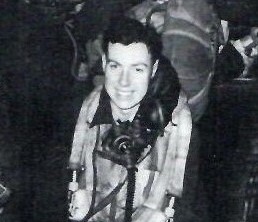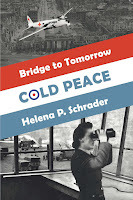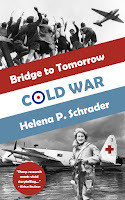The Characters of "Cold War" -- Flight Lieutenant Kit Moran
Like USAF Captain J.B. Baronowsky, Kit flew bombers during the war. Unlike J.B., he was severely injured and peace finds him with one foot less than he started the war. Kit Moran contributes to the themes of coping with disabilities and the scars of war, and it is largely because of them that he actively seeks participation on the Airlift.

Readers of "Lack of Moral Fibre" and/or "Moral Fibre" will be familiar with Kit Moran. The son of a Colonial Official and a missionary's daughter, he grows up in Africa. He leaves home at 16 to take an apprenticeship in the UK. When the war breaks out, he volunteers for the RAF. Initially he is trained as serves as an engine mechanic or fitter. This leads him to volunteer as a flight engineer, and in this capacity he flies 36 operations against Germany. On the 36th op, his skipper is mortally wounded and three other crewmen severely injured. When ordered to fly the next day with a crew he doesn't know, Kit refuses and is promptly expelled from his squadron for "lacking moral fibre."
The story of what happens to him next is the subject of "Lack of Moral Fibre" and Kit's subsequent wartime career as a Lancaster skipper is the subject of "Moral Fibre."
At the start of the Bridge to Tomorrow series, Kit is studying aeronautical engineering at Leeds University -- and getting one rejection letter after another from prospective employers. When graduation comes, he still has no job, so he, his wife and their four-month-old daughter move in with Georgina's parents. Georgina's father is an Anglican priest who has a living in rural Yorkshire.
An excerpt featuring Kit Moran:
“The car’s making a strange squeaking noise inthe back,” the Reverend Edwin Reddings told his son-in-law as he came throughthe back door. He was scratching his head as if puzzled.
“The brakes?” Kit asked back.
“I don’t think so. The noise seemed to start whenI stopped braking.”
“I’d better take a look at it,” Kit declared,getting to his feet.
“I can take it to the garage if you prefer,”Reddings offered.
“No, it might be dangerous for you to drive,”Kit told him, grabbing overalls from a hook by the back door. “We’ve got timebefore dinner. I’ll see if I can find out what’s wrong.” He stepped into thelegs of the overalls and continued outside as he pulled the arms over his shirtand fastened the buttons. For the first half of the war, Kit had been a fitter,and he retained his old work clothes for tasks like this — or mucking out thestalls of the two horses his in-laws kept in a stable at the back.
Kitwelcomed the distraction because he could use something practical to do justnow.Kit had spent the afternoon filling out anelaborate and lengthy application form for a job with Ethiopian Airlines. Afterbeing turned down for scores of engineering jobs over the last six months, hiswife Georgina had talked him into responding to an advertisement from EthiopianAirlines soliciting applications from pilots, flight engineers and ground crew.It was as much Georgina’s enthusiasm as his own frustration that had inducedhim to respond. Georgina believed that she would find opportunities to teach inEthiopia. Kit, however, had discovered that the Ethiopians, with their 2,000-yearhistory, maintained an arcane bureaucracy. He had never encountered anything quitelike this application form before — not even in the RAF. It was 20 pages longand included lengthy questions about his family, his religion, his educationand, of course, his experience.
Kit took the tool kit out of the boot of hisfather-in-law’s car and put it down on the ground. Then he lay down on his backand squirmed his way under the tailgate with a torch which he directed towards thebrakes. As he conducted the inspection, he was asking himself how he wassupposed to answer the question “When was the last time you flew an aircraft?”
Did he admit to flying without a license withLeonard Cheshire in a Mossie that the Group Captain might — or might not — stillhave owned? Or did he omit that flight (which he had not dared record in hislogbook) and say that the last time he’d flown he’d crash-landed, breaking theaircraft into three pieces and leaving his flight engineer crippled for lifewhile crushing his left foot under the instrument panel so completely that theyhad to cut it off to extract him before the fuel tanks exploded?
Which brought him to the question of themedical exam. In addition to the application form, Ethiopian Airlines had senta five-page “Medical Questionnaire” to be completed “by the applicant’sattending physician.” Aside from the fact that he didn’t have a particularphysician, what were the Ethiopians likely to do with the item: “Missing leftfoot and half of lower left leg.” He knew he could fly with his artificiallimb, but why should Ethiopian Airlines believe him? And why would any doctorpass him fit to fly —
“Kit! Kit!” It was the urgent voice of hisfather-in-law.
The reverend’s tone was so alarmed, that Kitpushed himself back out from under the car fearing some sort of calamity. Had hisdaughter Donna had an accident? Or Georgina? Reddings was gesturing to him fromthe back door, signalling him to come. “It’s a telephone call for you!”
Kit pushed himself off the ground, using his flesh-and-bonesfoot, and wiped the dirt off his palms on the already dirty thighs of the overallsas he hastened to the house. “Who is it?” he asked his father-in-law, who stoodholding the door open for him.
“A Mr Goldman calling from London about a jobinterview!” Reddings exclaimed flustered. He knew how hard Kit had been lookingfor work these past six months.
Puzzled, Kit frowned slightly. He couldn’tremember the name Goldman, but there might well have been a Goldman among the scoresof personnel chiefs to whom he’d sent his many letters of inquiry. He took up thetelephone receiver and spoke into the handset, “Good afternoon. This isChristopher Moran.”
“David Goldman,” came the crisp answer. “I’mthe Managing Director of Air Ambulance International based in Berlin, Germany.His Majesty’s Government has decided to contract civilian airliners on theBerlin Airlift. My company is looking into options for adding air freight toour ongoing ambulance operations. If we go ahead, we will need to employ pilotswith four-engine ratings and experience. You were recommended to us by AssistantSection Officer Hart as a possible captain.” Kathleen! Kit thought, noting thatshe had been promoted. On the other end of the line, the unfamiliar voicecontinued. “I’m calling to see, first, if you would be interested in what, dueto the nature of the work, must be a temporary position only, and if so, if youcould come to an interview at the Savoy Hotel in London tomorrow or Friday.” Atlast, the clipped voice paused long enough to allow Kit to answer.
Kit’s pulse was racing. He was being offered achance to fly the Airlift! The day the British government had announced theirintention to supply the city by air, he had told his father-in-law that hewished he could be part of it. Reddings, ever the optimist, had told him hethought he would. Kit had not believed him. He’d been invalided out of the RAFand had seen no possible way to become part of this military operation. Now,out of the blue, things had changed. Civilians were being given a chance tofly. He could hardly breathe for fear he might say something to spoil hischances. He tried to keep his voice neutral as he replied: “The answer to bothquestions, sir, is yes. However, I’m currently in Yorkshire. I’m not sure abouttrain connections, so Friday afternoon would be better.”
“Excellent. The interview will be with ourDirector of Personnel, Mrs Emily Priestman, who will be able to provide youwith additional details. She says…” Goldman covered the phone with his hand andhis voice became muffled and unclear. Then his voice came clear and loud againas he announced, “Mrs Priestman would have time for you at 4 pm. In the tearoom.Is that all right?”
“Yes, sir. That’s fine. How will I recognise her?”
“Mrs Priestman will be wearing our black andred uniform. You should have no difficulty finding and identifying her. Pleasebring your logbook and licences to the interview.”
“Yes, of course.”
“Do you have any other questions?”
“No, I’ll save them up for the interview.”
“Excellent. Good evening, then.”
“Good evening.”
The telephone connection went dead, replacedby the dialling tone.
Dazed, Kit replaced the receiver and turned tofind his father-in-law anxiously watching from the back door and his wife peeringat him from the stairs. “Kit?” She asked.
“I’ve got a job interview in London on Fridayat 4 pm. I’ll have to—”
“Congratulations!” Georgina and her fatherexclaimed simultaneously, Georgina jumping off the stairs to run into his arms whileher father came forward to shake his hand.
“Ethiopian Airlines?” Georgina asked eagerly.
“No. It’s an outfit called ‘Air AmbulanceInternational’ based in Berlin and interested in flying cargo on the Airlift.” He admitted the latter with a sheepish grinin the direction of his father-in-law.
“Didn’t I tell you this would happen? It isyour destiny!” Reddings declared triumphantly, his whole face beaming withdelight.
Kit is a character in all three volumes of the Bridge to Tomorrow Trilogy

The first battle of the Cold War is about to begin....
Berlin 1948. In the ruins ofHitler’s capital, former RAF officers, a woman pilot, and the victim of Russianbrutality form an air ambulance company. But the West is on a collision coursewith Stalin’s aggression and Berlin is about to become a flashpoint. World WarThree is only a misstep away. Buy Now
Berlin is under siege. More than twomillion civilians must be supplied by air -- or surrender to Stalin's oppression.
USAF Captain J.B. Baronowsky and RAF FlightLieutenant Kit Moran once risked their lives to drop high explosives on Berlin.They are about to deliver milk, flour and children’s shoes instead. Meanwhile,two women pilots are flying an air ambulance that carries malnourished andabandoned children to freedom in the West. Until General Winter deploys on theside of Russia. Buy now!
Based on historical events, award-winning and best-selling novelistHelena P. Schrader delivers an insightful, exciting and moving tale about howformer enemies became friends in the face of Russian aggression — and how closethe Berlin Airlift came to failing.
Winning a war with milk, coal and candy!



